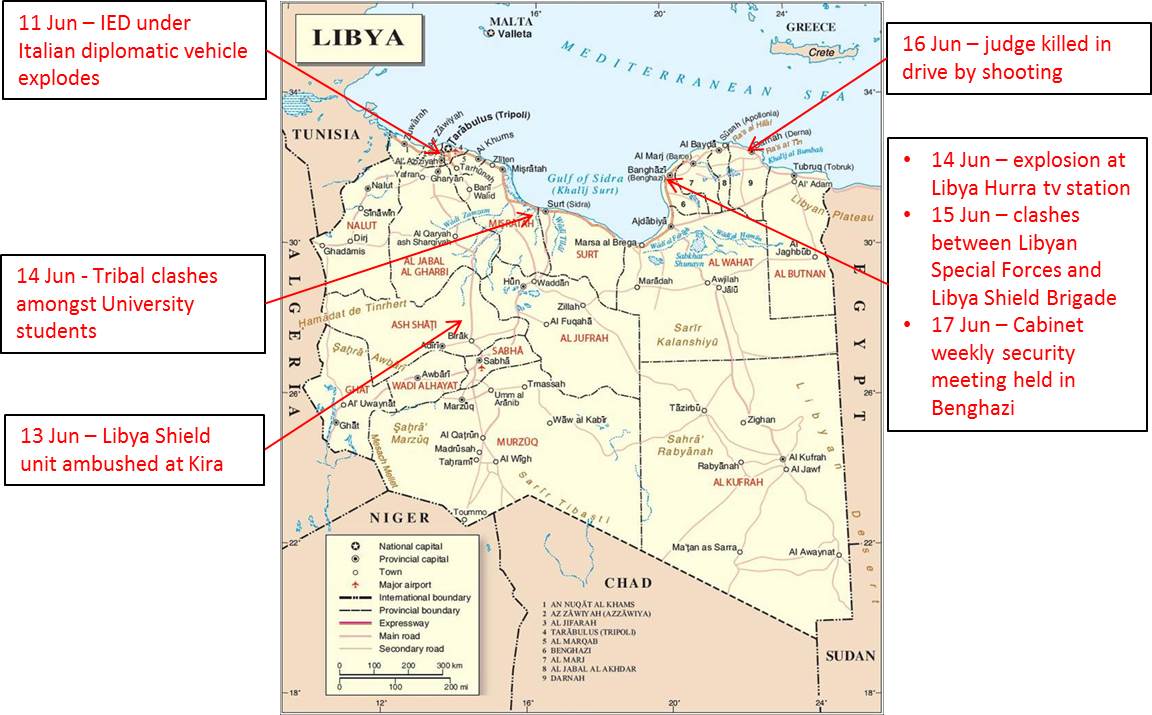Overview
This week has been dominated by the aftermath of the Libya Shield Brigade killings in Benghazi. Politically there is a national sense and recognition that it may have taken this terrible incident for the country’s politicians and wider civil society to decide that ‘enough is enough’. This realisation is meaningless without decisive action but there are signs from the new Army Chief of Staff in particular that he has the resolve and stomach to tackle the militias. He has been clear that they either need to be disarmed or integrate themselves fully into the armed forces. The Prime Minister reinforced this message when he saw the US Under Secretary of State for Political Affairs on Monday and requested US support in training the Libyan Army and Police. Regardless there is still a long way to go before we will be able to say that the Libyan state has turned the corner and regained the monopoly of force.
The situation still remains in the balance in Benghazi and is part of a wider battle for control of the east of the country with competing interests – all of whom are armed – continuing to struggle for supremacy. The mosaic of interests is complex and includes the central government, Islamists, Federalists, tribes and former regime elements. As elements of the Libyan Army have sought to regain control of Benghazi they have been faced by sporadic armed opposition from elements of the Libya Shield Brigade resulting in further violence. This unrest has been fanned by this Friday’s Prayers when many of the sermons were critical of the original protest against the Libya Shield Brigade. This shows the strength of the Islamist agenda that predominates in the east still.
The unrest is not confined to the east as shown by the continued targeting of western interests in Tripoli. This week the Italian embassy was targeted when an Improvised Explosive Device exploded under one of its cars. Fortunately the device had been noticed before it functioned and so there were no casualties. There has been unrest in Sirte with students clashing over tribal issues leaving three dead.
Tripolitania (Western Libya)
The new army chief of staff, Salem al-Gnaidy has settled quickly and provided a decisive lead in a way his predecessor, Mangoush, did not when he called for all armed groups to integrate fully within the armed forces or risk direct confrontation: “Farmers should go back to being farmers and let the army do its job of protecting the nation.”
The Italian diplomatic mission was targeted on 11th June when a device attached to the underside of one of its cars exploded. Fortunately the device had been spotted by the car’s driver and the car and area was evacuated in the Zawiat Al-Dahmani before it exploded causing damage but no casualties.
Tribal related clashes have broken out this week between students at the city’s university leaving three dead and others wounded. The university has been closed as a result.
Whether the current security situation in Benghazi is the reason but it now appears that the move of the NOC to Benghazi which was seen as a sop to the Federalists may not take place after all and certainly remains on hold for the time being.





